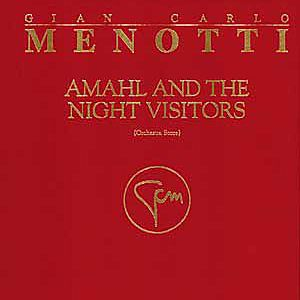
Overview
Synopsis
Based on Italian folk tales of the Nativity and Epiphany, Gian Carlo Menotti’s Amahl and the Night Visitors is a retelling of the story of the Magi from the point of view of a young disabled boy named Amahl, who lives in poverty with his widowed mother near Bethlehem. He sees a bright star in the sky one night and tells his mother to go look, but she brushes him off, buried in concern over their bleak future and lack of means with which to support themselves. That night, three kings come across their meager hut and seek shelter, for they have traveled long and far following the star of which Amahl had spoken. They bring with them treasure and gifts to give to “the Child” who has just been born and who will reign over all. Blinded by the lure of the gold and what it could do for her family. the Mother attempts to steal just a bit of the treasure, but is caught red-handed. What no one expects is a gift far greater than gold--blessed by the Child, Amahl finds himself suddenly cured of his disability. A vivid and accessible tale originally created for television, Amahl and the Night Visitors is a perfect first opera--or hundredth!
Show Information
Context
The very first opera ever to be commissioned specifically for television, Amahl and the Night Visitors premiered at the NBC Television Opera Theatre in New York City’s Rockefeller Center on Christmas Eve, 1951. Gian Carlo Menotti not only composed the music, but also created the libretto, and the original production was also staged entirely by the composer himself. While the opera was created for television, Menotti still wrote with the stage in mind so as to maintain its versatility. “On
to read the context for Amahl and the Night Visitors and to unlock other amazing theatre resources!Plot
Note: The opera is in a single, continuous act without scene breaks or musical separations. In parentheses are cues to aid in lining up the story with the libretto.
The scene opens on a shepherd’s hut, where a young boy, Amahl, is sitting just outside playing a pipe. His crutch, without which the disabled boy is unable to walk, lies on the ground next to him. Inside, his mother works at household chores by a dim fire. She calls him inside to bed, and he finally and reluctantly obeys
to read the plot for Amahl and the Night Visitors and to unlock other amazing theatre resources!Characters
| Name | Part Size | Gender | Vocal Part |
|---|---|---|---|
|
Lead |
Female |
Soprano |
|
|
Lead |
Male |
Treble/Boy Soprano |
|
|
Supporting |
Male |
Tenor |
|
|
Supporting |
Male |
Baritone |
|
|
Supporting |
Male |
Bass |
|
|
Featured |
Male |
|
|
|
Ensemble |
Female |
|
|
|
Ensemble |
Either Gender |
|
Songs
The opera is in a single continuous act, without scene breaks or musical separations. (Written into the plot synopsis are cues to aid in lining up the story with the score.)
Popularly excerpted “arias” are “All that Gold” (The Mother) and “This is My Box” (King Kaspar).
A song with an asterisk (*) before the title indicates a dance number; a character listed in a song with an asterisk (*) by the character's name indicates that the character exclusively serves as a dancer in this song, which is sung by other characters.
Monologues
Scenes
Key Terms
Sorry! We do not currently have terms for this guide.
Videos
Quizzes
Sorry! We do not currently have quizzes for this guide.
Themes, Symbols & Motifs
Sorry! We do not currently have learning modules for this guide.
Quote Analysis
Sorry! We do not currently have learning modules for this guide.
